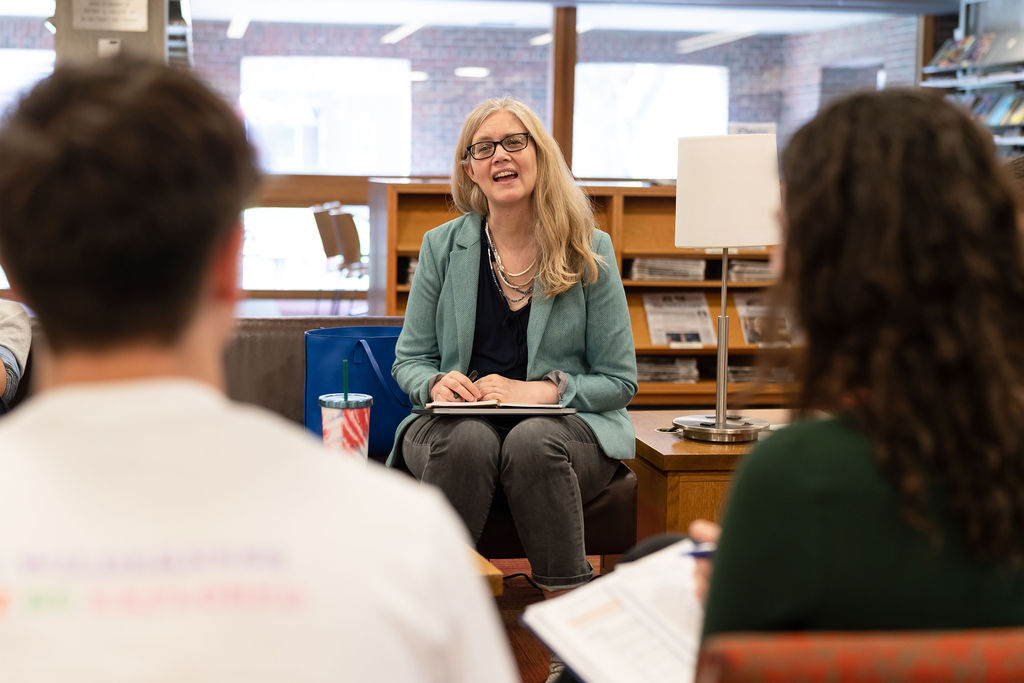A conversation with the director of The Learning Center

“The Learning Center is just another way for us to provide support for students. ... They don’t have to know everything — that's part of the learning process.”
It can be hard to ask for help — especially for overachieving Exonians. As director of The Learning Center, the student-focused pillar of The Center for Teaching and Learning, Genny Moriarty wants students to realize that seeking academic support from peer and adult tutors can be a valuable and even fun part of their Exeter education.
“The Learning Center is just another way for us to provide support for students,” Moriarty says. “We want to encourage them and help them realize they don’t have to know everything — that’s part of the learning process.”
After joining the English Department as a part-time instructor in 2014, Moriarty joined Exeter’s Office of Communications in 2015, before transitioning back to the classroom in December 2018. In the fall of 2021, she took on the role of directing The Writing Center and worked alongside fellow English instructor Alex Myers ’96 to expand The Learning Center from its beginnings in writing and math support to where it is today. She became director the following year.
We spoke to Moriarty about the different kinds of support available at The Learning Center, why sometimes students learn better from their peers and her goals for the centers in the future.
What kind of support can students find at The Learning Center?
Monday through Thursday nights from 7 to 9:30, we offer math and science help in the Elting Room in Phillips Hall. We usually have two adults on duty and a number of peer tutors. I think the STEM Center might be the place where we have the highest demand for peer tutoring; they have a lot of people coming in for help on a pretty nightly basis.
Also in Phillips Hall, we have The Writing Center and The Language Center. Each night we have two adult writing tutors, and they offer one-on-one help. We also have a room for peer writing tutors. People can drop in to get help from them or sign up for appointments with one of the adults on duty. In The Language Center, we have one or two faculty on duty along with peer tutors — and I try to arrange it so that we have somebody who can offer help in most languages on most nights.
The Art Department also offers open studio hours for students currently enrolled in art classes. Several members of the Art Department rotate those shifts, and students can go to the studios and get help from whichever teacher is on duty, with projects they’re currently working on.
Why is having peer tutors (in addition to adult tutors) so important?
It’s very Harkness-centered — students learning from one another. We do that in our classrooms, and now we’re doing it outside of the classroom as well. I think sometimes it can feel a bit more approachable to go to a student. Students also sometimes have a way of explaining things that the teacher doesn’t. They can offer a different perspective. And sometimes peer tutors can share where they have stumbled or struggled with a certain subject themselves, which can be very helpful.
What do you enjoy most about working as a tutor?
One of the things I love when I work with students at The Writing Center is that it’s a different dynamic when you’re working with somebody who’s not grading your paper. There’s something really lovely about being able to talk about writing with students in that regard. Maybe they’re more inclined to take a creative risk or try something new, even if it doesn’t work out, within that space.
How do you approach helping students who could benefit from The Learning Center, but aren’t using it?
I know there are students for whom it’s harder to ask for help. One thing I love about The Learning Center is that we’re starting to shift the way people are thinking about not having all the answers. I’m always happy when I see new names signing up for writing center appointments. Sometimes I will reach out to advisers, just to say, “Hey, just wanted to remind you that this is an option. If you feel like it would be helpful, you can send your advisee to me, and I’ll talk to them about it or invite them.”
Teachers and advisers are also beginning to suggest the centers to students. I’ve also met with different groups throughout the year, such as the Equitable Exeter Experience (E3) participants; new Exonians who attended the student support services fair, and our student listeners, so they know a little bit more about who we are and what we do.
What are some of your goals for The Learning Center?
Last year The Writing Center offered workshops on topics like student journalism, proper citing of sources and submitting work for writing contests. That’s something I’d like to get back to next year.
Another goal I’d really like to focus on next year is to do more training with our peer tutors. I think it might be helpful to formalize the selection process or at least offer more training on what makes an effective tutoring session: How can we encourage students but still allow them to be doing the work on their own? How do we make people feel encouraged, not discouraged, and when and where do we step in?
As a long-term goal, it would be gratifying to have our own center. It’s exciting to think about what the possibilities could be if we were to have our own space down the road.